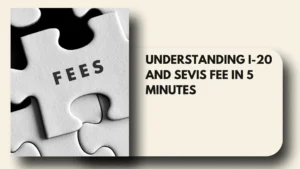- The Germany Long Stay Student Visa (Type D) is mandatory for non-EU/EEA students staying over 90 days, offering rights like part-time work (120 days/240 half-days) and Schengen travel.
- You need a university admission letter, proof of EUR 11,208 financial support (via blocked account or scholarship), health insurance, accommodation proof, academic records, and language proficiency.
- From securing admission and arranging finances to attending the visa interview and completing post-arrival formalities (Anmeldung and residence permit), the process takes 6–12 weeks, so plan early.
- What is the Germany Long Stay Student Visa?
- What are the German Student Visa Requirements?
-
Step-by-Step German Student Visa Application Process
- Step 1: Receive Your University Admission Letter
- Step-2: Arrange Proof of Financial Resources
- Step 3: Purchase Health Insurance
- Step 4: Gather All Required Documents
- Step 5: Schedule Your Visa Appointment
- Step 6: Attend Your Visa Interview and Submit Your Application
- Step 7: Wait for Visa Processing and Decision
- Step 8: Post-Arrival Formalities in Germany
- Important Visa Interview Questions for German Student Visa
- What to Do if Your Germany Student Visa is Rejected?
- Key Takeaways by AdmitX
- FAQs
Germany has long been a top choice for international students, and for good reason. With its globally recognised universities, tuition-free or low-cost education, cutting-edge research opportunities, and vibrant student life, Germany offers an ideal environment for academic and personal growth. Before embarking on your educational journey, however, securing the appropriate visa is one of the most crucial first steps.
This comprehensive and updated 2025 guide provides you with everything you need to know about applying for the Germany student visa, from visa types and document requirements to step-by-step application guidance and post-arrival formalities.
What is the Germany Long Stay Student Visa?
The Germany Long Stay Student Visa, formally called the National Visa (Type D), is issued to non-European Union (EU) and non-European Economic Area (EEA) nationals intending to stay in Germany for more than 90 days to pursue educational goals.
It acts as the initial entry permit and, upon arrival, must be converted into a residence permit to continue staying legally throughout the study period. This visa not only allows you to study full-time but also grants following rights and flexibility that enhance your overall experience:
- Part-Time Work Rights: You can work for 120 full days or 240 half days annually, a valuable option for supplementing your finances and gaining professional experience in Germany.
- Schengen Area Travel: You can travel freely across the 27 Schengen countries, spending up to 90 days within a 180-day period outside Germany.
- Pathway to Residence Permit: After arrival, you convert this visa into a study residence permit, which is extendable as long as you remain enrolled.

What are the German Student Visa Requirements?
Securing a German student visa requires meeting well-defined eligibility conditions. These are intended to ensure that applicants are financially stable, genuinely pursuing education, and have a clear plan for their stay.
Here’s a breakdown of core Germany Long Stay Student Visa Requirements
University Admission Letter
- You must present a valid admission letter (Zulassungsbescheid) from a recognised German institution.
- Conditional or unconditional offers from a university, Studienkolleg (foundation course), or preparatory program qualify.
Proof of Financial Resources (Finanzierungsnachweis)
- Germany mandates that international students demonstrate adequate financial means to cover living expenses for at least one year.
- As of 2025, this is set at €11,208/year (about €934/month).
Acceptable proof includes:- Blocked Account (Sperrkonto) confirmation
- Scholarship award letter
- Formal Declaration of Commitment (Verpflichtungserklärung) from a German sponsor
Health Insurance Coverage
You must have valid health insurance at the time of visa application and for your entire stay in Germany. You can opt one of the 2 following health insurance options.
- Public statutory insurance (AOK, TK, Barmer): Compulsory for students under age 30
- Private insurance: For language courses, over-age students
Accommodation Proof
Proof that you have arranged for housing in Germany, such as:
- University dorm confirmation
- Private rental contract
- Invitation/letter from a host
Academic Records
Submit transcripts, mark sheets, and degree certificates of all your prior education (12th standard, bachelor’s, etc.), along with certified translations if required.
Language Proficiency Proof
Depending on your program
- German-taught courses: TestDaF, DSH, Goethe Zertifikat, etc.
- English-taught course: IELTS, TOEFL (usually IELTS 6.5 or TOEFL 80+)
Passport
Your passport must be valid for at least 90 days beyond your intended stay.
Passport-Sized Photographs
Ensure that they meet the German consulate’s specifications for size and quality.
Step-by-Step German Student Visa Application Process
Step 1: Receive Your University Admission Letter
- Before you begin your visa process, you must first secure admission to a recognised German university, a preparatory Studienkolleg (foundation course), or another higher education institution in Germany.
- Admission can be obtained by applying either directly to your chosen university or through the uni-assist.de platform, which is used by many German institutions.
- For visa purposes, an unconditional admission letter is ideal, though a conditional offer is still acceptable in most cases.
- It is advisable to start applying to universities well in advance of deadlines, as processing times for both university admissions and visas can be lengthy.
Step-2: Arrange Proof of Financial Resources
- One of the most important visa requirements is demonstrating that you have enough funds to cover your living expenses in Germany for at least one year.
- As of 2025, the German government requires proof of at least EUR 11,208 or INR 10 Lakh, which averages to about EUR 934 or INR 89,000 per month.
- The most common method for showing this is by opening a Blocked Account, known in German as a Sperrkonto.
- You can open a blocked account through reliable providers such as Fintiba, Expatrio, or Deutsche Bank. Fintiba and Expatrio offer digital solutions and faster processing, while Deutsche Bank generally requires in-person appointments and more documentation.
- Alternatively, if you have secured a full scholarship from organisations like DAAD, you can submit your scholarship award letter as proof of financial support.
Step 3: Purchase Health Insurance
- Health insurance coverage is mandatory for all international students in Germany and you will need to show proof of valid insurance both for your visa application and after your arrival in Germany.
- If you are enrolling in a full-time degree course and are under the age of 30, you are eligible for statutory (public) health insurance.
- Prominent providers such as AOK, TK (Techniker Krankenkasse), and Barmer offer extensive coverage for international students.
- The monthly premium typically ranges from EUR 110 to 120 or INR 10,500-11,500.
- If you are enrolling in a language course, are over the age of 30, or are ineligible for statutory insurance, you will need to purchase private health insurance.
- Providers like Mawista and Care Concept offer policies specifically tailored for international students and language learners.
- For your visa application, you can submit a preliminary confirmation of insurance coverage, which can later be activated fully once you arrive in Germany and register with your university.
Step 4: Gather All Required Documents
- The document collection stage is one of the most critical in the application process.
- You should ensure that you have original copies of all your documents as well as two or more sets of photocopies.
- If any documents are in regional languages, certified translations into either English or German are mandatory.
- You will need a completed and signed National Visa application form, a valid passport with at least 12 months validity beyond your intended stay, and two recent biometric passport photographs that meet German embassy specifications.
- Additionally, you should include your full academic records, which comprise transcripts, mark sheets, and degree certificates from all previous education levels. Proof of language proficiency is also required.
- This may include IELTS or TOEFL scores for English-taught programs or TestDaF, DSH, or Goethe-Zertifikat results for German-taught programs.
- You should also prepare evidence of accommodation arrangements in Germany, such as a university dormitory booking, a private rental contract, or a letter of invitation from a host.
- Lastly, you should include an updated CV and a clear and focused motivation letter explaining why you have chosen your specific course and how it aligns with your career goals.
Step 5: Schedule Your Visa Appointment
- Once you have all your documents ready, the next step is to schedule your visa interview appointment.
- This is done through the official website of VFS Global Germany or the German embassy or consulate responsible for your jurisdiction in India. Registration is required to book your appointment online.
- Select the National Visa category and indicate that your purpose is for study. Visa appointments are limited and often booked several weeks in advance, especially between May and August.
- It is advisable to secure your appointment at least 6-8 weeks ahead of your preferred date to ensure a smooth timeline.
Step 6: Attend Your Visa Interview and Submit Your Application
- On the day of your appointment, arrive at the visa application center or German consulate at least 30 minutes early.
- Carry all your documents carefully organised, including originals and photocopies, and your printed appointment confirmation.
- The submission process involves biometrics (fingerprints and photograph capture), submission of your documents, and a brief personal interview.
- During the interview, be prepared to discuss your academic goals, reasons for choosing Germany and your specific course, how you plan to finance your studies, and details about your accommodation and future plans.
- It is important to answer clearly and confidently. Providing honest, coherent answers that align with your documents demonstrates preparedness and intent.
- Once your documents are submitted and your interview is complete, you will be asked to pay the visa application fee.
- The Germany long-stay student visa fee is EUR 75 or INR 7,000, payable in INR at the current exchange rate.
- Payment modes vary by center and may include demand draft, cash, or card.
- After payment, ensure you collect and retain the payment receipt.
Step 7: Wait for Visa Processing and Decision
- Your application will now be forwarded to the German consulate or embassy for processing.
- The German student visa processing time ranges from 4-12 weeks depending on the workload, background verification needs, and completeness of your application.
- On average, most student visa decisions are made within 6-8 weeks.
- You can track your application status via the VFS Global portal and should regularly monitor your email for any updates or additional document requests.
- Once your visa is approved, you will be notified to collect your passport.
Step 8: Post-Arrival Formalities in Germany
- Once you arrive in Germany, you are required to complete two crucial steps to legally reside and study.
- First, within 1-2 weeks of moving into your accommodation, you must register your local address at the Bürgeramt (local registration office).
- This process is called Anmeldung and you will receive a residence registration certificate (Meldebescheinigung).
- Next, within the validity period of your 90-day entry visa, you must apply for a long-term residence permit (Aufenthaltstitel) at the local Foreigners’ Office (Ausländerbehörde).
- You will need to bring your passport, visa, admission letter, proof of blocked account, proof of health insurance, confirmation of address registration, and a biometric photograph.
- The residence permit is typically granted for one to two years and can be extended for the full duration of your studies.
Important Visa Interview Questions for German Student Visa
Here’s a curated list of typical questions you may be asked at your visa interview:
- Why do you want to study in Germany and not your home country?
- Why did you choose this university and course?
- How does this program fit into your long-term career plans?
- How will you finance your stay in Germany? Can you show proof?
- Do you have accommodation secured in Germany?
- What are your plans after completing your studies?
- Do you speak German? Have you travelled to Germany before?
- Are you aware of German culture, cost of living, and local laws?
What to Do if Your Germany Student Visa is Rejected?
While the German visa rejection rate is relatively low, rejections do happen. If your application is denied, here are the steps to recover:
Request the Refusal Letter
- Obtain a written letter from the embassy explaining why your visa was refused.
- Common reasons include insufficient finances, weak motivation letter, or incomplete documents.
Reapply with Corrected Documents
- Carefully address the issues mentioned in your refusal letter and reapply.
- Make sure all documents are accurate, consistent, and up to date.
Appeal the Decision (Remonstration)
- You have the right to submit a Remonstration Letter to challenge the refusal within 1 month.
- Provide clarifications, missing documents, and a strong explanation of your academic intent.
Key Takeaways by AdmitX
To study in Germany, you need to secure admission to a recognised university, prove that you can financially support yourself with at least EUR 11,208 in a blocked account or through a scholarship, and arrange valid health insurance before applying for your visa. You will gather essential documents such as your admission letter, financial proof, academic records, APS certificate (if you are an Indian student), and language proficiency certificates.
Once your paperwork is ready, book a visa appointment through VFS or the German embassy, attend the interview confidently, and submit your application. The visa fee is €75, and processing can take four to twelve weeks. After receiving your visa, travel to Germany and complete post-arrival tasks like registering your address and applying for a residence permit at the local foreigners’ office.
FAQs
Do I need the APS certificate before applying for the German student visa as an Indian student?
Yes. all Indian students applying for a German student visa must obtain the APS (Academic Evaluation Centre) certificate. It verifies the authenticity of academic records and is a mandatory document to be included in your visa application.
How much money should I show in my blocked account for the German student visa in 2025?
As of 2025, the required amount is €11,904 for one year, which equals €992 per month. This amount must be deposited into a blocked account before applying for the visa, and access to the funds will be limited to a monthly withdrawal as per the German government’s rules.
How long does the German student visa take to process for Indian students?
On average, the processing time ranges between 4 to 12 weeks, depending on the individual case and embassy workload. Students are strongly advised to apply for their visa at least 3 months before the start of their course.
Can I work while studying in Germany on a student visa?
Yes. International students on a German student visa are allowed to work 120 full days or 240 half days per year. Any additional employment requires special permission from the Federal Employment Agency and the Foreigners’ Authority.
Is German language proficiency required for the visa if I’m studying in English?
If your course is taught in English, German language skills are not mandatory for the visa, but you must provide proof of English proficiency through exams like IELTS or TOEFL. However, having basic German knowledge can help in daily life and is encouraged.
Check out Other Blogs















